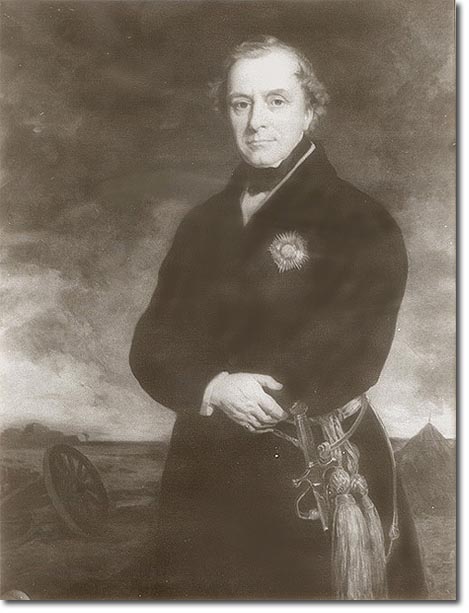|
|

 |
|
Henry Hardinge, the son of the Reverend Henry Hardinge was born and died in Kent. During the Peninsular War he served as deputy to D'Urban, QMG to the Portuguese Army. He was highly regarded by the Duke of Wellington and served under him for many years both in the army and in Parliament. At Torres Vedras, The Duke asked Beresford to send '..Hardinge or some other staff officer who has intelligence, to whom I can talk about the concerns of the Portuguese Army.' And when Napoleon returned from Elba, Hardinge was given the task of placing himself as close as possible to Napoleon to keep Wellington appraised of his movements. At the battle of Ligny a stone driven up by a cannon ball smashed Hardinge's left hand so that it had to be amputated at the wrist. The treatment was poor and during the retreat to Wavre he suffered intense pain.
In politics, Hardinge was one of the Prime Minister's inner circle during the premiership of The Duke of Wellington. He was Secretary at War and later Irish Secretary. Wellington was criticised for running the government like a military campaign, employing his old army chums, like Hardinge, in the cabinet. When the Duke was accused in the press of infringement of liberties and introducing Popery, by Lord Winchelsea, a duel was arranged near Battersea Bridge with Hardinge as Wellington's second. Because he only had one hand, Hardinge was unable to load the pistols; this was done by Wellington's doctor, Hume. No-one was hurt in the affair. As Governor-General of India, Hardinge re-introduced flogging as a punishment of sepoys and sowars. He forbade working on Sunday in government establishments and encouraged public education. He strongly advocated the building of the railways in India but this did not start until his successor, Dalhousie, took over. He took measures to prepare for a war with the Sikhs when it became clear that trouble was brewing on the other side of the Sutlej. The command of the British and Indian Army was given to Sir Hugh Gough and Hardinge decided to serve in a military capacity as Gough's second-in-command. However, he had to revert to his position of Governor-General to over-rule Gough's decision to move against the Sikhs at Ferozeshah without waiting for Sir John Littler's force of 10,000 men to arrive. When the Duke of Wellington died in 1852, Hardinge took over command at Horse Guards, but it was a bad time to be in charge as the Crimean War fiasco of 1854-5 needed a scapegoat. Wellington had made little effort to modernise the army in the years between Waterloo and the Crimea, and Hardinge was so much in awe of the Duke that, when he took over he did not disturb the routine arrangements that had been sanction by his predecessor. The public were angry that the soldiers had suffered so much because of bad administration, poor supplies and health care, and Lord Hardinge was blamed. A year after he was promoted to Field Marshal he was struck with partial paralysis and obliged to retire. He died a few months later, aged 72 and buried in the church at Fordcombe where he laid the foundation stone on his return from India and which was built mostly through his generosity.
1775 March 30th, born in Wrotham, Kent. |
| Campaigns | First Sikh War |
Armed Forces | Art and Culture | Articles | Biographies | Colonies | Discussion | Glossary | Home | Library | Links | Map Room | Sources and Media | Science and Technology | Search | Student Zone | Timelines | TV & Film | Wargames
